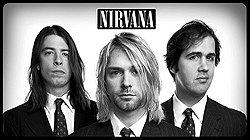NIRVANA
With the Lights Out
(Geffen)
Nirvana’s first three major posthumous releases didn’t exactly get my flannel in a bunch. While MTV Unplugged in New York offered a handful of eclectic, heartfelt covers, the originals were rote and the whole cello-‘n’-brushes affair seemed designed to make punk palatable for soccer moms but not much more. 1996’s live mishmash, From the Muddy Banks of the Wishkah, was way forgettable, and last year’s eponymous, best-of cash-in offered just one new track, the unremarkable, soft-loud purge “You Know You’re Right.” All of which was fine and dandy for casual fans, but where were all those killer B-sides, demos, and rarities that indie shops were hawking on CD-Rs for $30 a pop? I wanted to know everything about Kurt Cobain’s riff hand, not his noggin (which made the publication of his Journals even more abominable). Now, after a decade of nasty, avaricious legal wrangling, The Box is finally here in all of its four-disc, 81-track glory, and it’s consistently mind-blowing enough to remind anyone exactly why Nirvana were a favorite band. Most of the tracks sound like they were recorded in a used Doc Martens box, but their poetic TNT simply can’t be contained. It’s a listening experience that you should have on your own—in the dark, as the title suggests—before the imminent, unbearable hype avalanche.
The set is organized logically—one CD for deliciously sloppy Bleach-era odds and ends, one for the Icarus roller coaster surrounding Nevermind, one for the more introspective, esoteric In Utero days, and a DVD encompassing the entire enchilada. The first disc flaunts a happy-go-lucky Leadbelly set Cobain performed with Mark Lanegan after a joint writing session flopped, plus a rambunctious 1987 Olympia college radio performance engineered by John Goodmanson. None of the kinda-familiar rarities (“Spank Thru,” “Pen Cap Chew”) are much better than what made it on the notoriously quickly recorded Bleach, but they’re all what you’d rightfully anticipate: Cobain, bassist Krist Novoselic, and a litany of drummers cobbling their Melvins influences and personal quirks into the Sound That Would Change Everything.
Disc two opens with a gorgeous, five-track, acoustic, mostly hits set, then spirals into sloppy Nevermind demos with alternate lyrics tailor-made for the prying ghouls who pore over Journals. Crunchy leviathans “Oh, the Guilt” (from a split 7-inch with the Jesus Lizard) and “Curmudgeon” are far more potent than both the ugly rehearsal demo and chlorine-clean Butch Vig mix of “Smells Like Teen Spirit.” In Utero, Nirvana’s most ambitious album, sadly fuels With the Lights Out‘s least satisfying disc. Alternate versions of the self-involved “Rape Me” are unmoving; “I Hate Myself and Want to Die” isn’t nearly as blistering as the Beavis and Butthead Experience version; and “Gallons of Rubbing Alcohol Flow Through the Strip” is just meandering spoken-word inanity.
The DVD, on the other hand, is out of this world, opening with an extended ’88 rehearsal at Novoselic’s mom’s house. A ponytailed Cobain wails into the wood paneling, random stoner bros actually flip a light switch on and off to augment the lone strobe, and the band speeds the shit out of Zeppelin’s “Immigrant Song” (one of three Zep covers in the set). It ends with a subdued in-studio cover of “Seasons in the Sun” featuring Cobain on drums, Novoselic on guitar, and drummer Dave Grohl on bass. I can’t imagine a more magical, heartbreaking, fucking brilliant eulogy. ANDREW BONAZELLI
SAINT ETIENNE
Travel Edition 1990–2005
(Sub Pop)
In 1990, the British dance-pop outfit Saint Etienne emerged triumphant from the last days of a dying era (the ’80s), turning Neil Young’s “Only Love Can Break Your Heart” (sung by Moira Lambert, who’d soon be replaced by Sarah Cracknell) into an unlikely club smash. The cover is so imaginative and assured, you’d be forgiven for assuming it’s an original. Sub Pop’s new greatest-hits collection shows Etienne at their best, clobbering the notion that backward-looking pop is necessarily constrained by its roots. “Sylvie,” from 1998’s Good Humor,channels the campy grandeur of ’70s disco (“Seventeen, high school queen/Yeah, you’re pretty cute, I can see/Well, you’ve come a long way since September”), but however transparent its influences—a piano intro worthy of Joni Mitchell becomes an ABBA-style shimmy—the song amounts to more than genre mimicry. This effect owes a lot to Cracknell’s wispy, candy-sweet voice, which glides over glassy production like a low wind over ice fields—nowhere more gorgeously than on “Avenue” (from 1993’s So Tough), whose structural wizardry clearly affected the likes of Air. The melodic line sneaks up on you, transforming from sonic stage dressing into a soaring, quasi-instrumental motif that equates club-music reverie with religious epiphany. What the Postal Service achieved last year with “Such Great Heights”—a dance single, seemingly plucked from the ’80s, that betrayed its true provenance through its lyrics—has been Etienne’s stock-in-trade for 15 years. Sometimes, the music that floats into the background ends up getting inside your head the most. NEAL SCHINDLER




